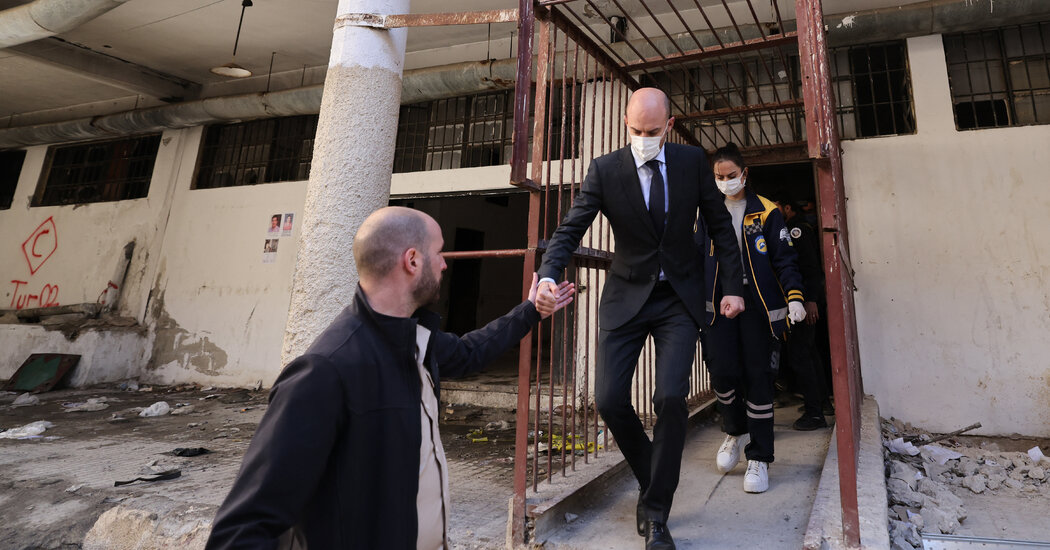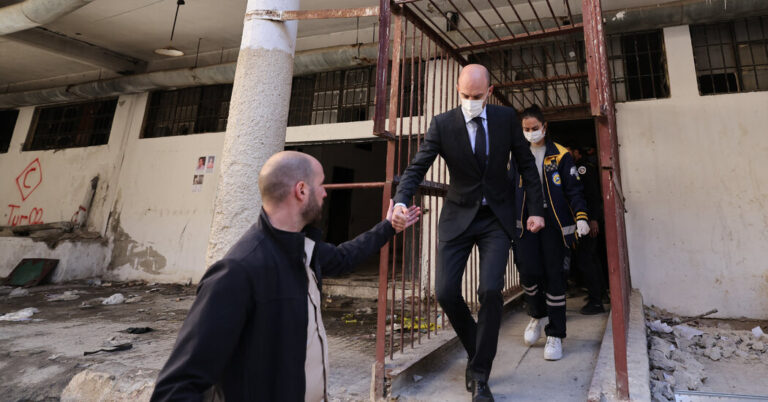Syria’s new leaders met with French and German foreign ministers in the capital Damascus on Friday, in one of the highest-level Western diplomatic visits since the fall of President Bashar al-Assad last month.
German Annalena Baerbock and her French counterpart, Jean-Noël Barrot, arrived in Damascus on the first such trip in years on behalf of the European Union, as world powers began building ties with Hayat Tahrir al- Sham, the Islamic group that leads the new Syrian government.
Ms Baerbock and Mr Barrot met Ahmad al-Shara, the group’s leader, after visiting the infamous Sednaya prison, where the al-Assad regime had tortured and killed thousands of inmates.
“We travel to Damascus today to offer our support, but also with clear expectations of the new rulers,” Ms. Baerbock said in a statement before the meeting. “A new beginning can only happen if all Syrians, regardless of their ethnicity and religion, are given a place in the political process.”
The visits are part of a series of contacts between rebel leaders and Western officials seeking to gradually open channels to the new Syrian authorities. Al-Shara has worked to project a moderate image since taking power.
Hayat Tahrir al-Sham is still blacklisted by the United States and the United Nations as a terrorist group due to its past ties to Al Qaeda. Al-Shara called on the international community to remove that designation and sought to reassure minority groups, saying it wants to focus on rebuilding Syria after years of civil war.
“Current events require the lifting of all sanctions against Syria,” he said in a television interview last month.
Barrot said France was urging Damascus’ new rulers to pursue a political transition that allows “all communities in Syria, in all their diversity, to be represented.” Part of this included reaching a “political solution” with the Kurdish minority, which created an autonomous region in northeast Syria.
The diplomacy comes amid a realignment across the Middle East, where the al-Assad regime was a key part of Iran’s regional coalition. Decades of iron-fisted rule by his family were opposed by many Syrians, spurring the 2011 uprising and civil war. At least six foreign armies were involved in the fighting, including those from Iran, Russia and Türkiye.
Many countries – including the United States – have begun to forge ties with the new government. In late December, Barbara Leaf, the State Department’s senior Middle East official, met with al-Shara in Damascus and told him that Washington would no longer seek an exceptional bounty for his arrest.
Some Syrians – particularly Christians and other minority groups – are uncertain about Mr al-Shara, pointing to Hayat Tahrir al-Sham’s conservative Islamic roots. In Idlib, a province controlled by the group since 2017, its leaders have banned the purchase and sale of alcohol and opened a chain of free religious schools. But the al-Shara faction has avoided the draconian decrees and brutal punishments of extremists such as the Taliban and the Islamic State.
In a sign of nervousness among some Syrians, a post on a Facebook page run by the Education Ministry this week described a new curriculum that was interpreted by some as having a more Islamist slant.
It is unclear whether any of the changes have been implemented, but Education Minister Nadhir Al-Qadri issued a clarification saying the curriculum remained unchanged, except for the removal of “content glorifying the Assad regime.” and the addition of images of the Syrian revolutionary flag.
Hayat Tahrir al-Sham officials have presented an ambitious plan to establish a new government, and rebel leaders have assumed key positions to oversee the transition. They say they are establishing an interim government in consultation with Syrians of all backgrounds, as well as a committee to draft a new Syrian constitution.
Many in the region are also wary of Syria’s new government, including Gulf states such as the United Arab Emirates, which have long sought to prevent the rise of groups that embrace political Islam, as has Israel.
Israeli warplanes bombed Syrian defense research sites near Aleppo on Friday night, according to the Syrian Observatory for Human Rights, a war monitoring group. There was no immediate news of casualties. Israel declined to comment on the report.
Since the fall of Assad, Israel has conducted hundreds of airstrikes against Syrian military sites in an attempt to eliminate sophisticated weapons such as chemical weapons and long-range missiles. Al-Shara said it would maintain a long-standing ceasefire agreement with Israel, saying Syria poses no threat to its neighbors.
Here are other developments in the region:
-
Houthi missile attacks: The Iran-backed Houthi militia in Yemen fired a ballistic missile at Israel before dawn Friday, setting off air raid sirens across central Israel, including Jerusalem. The Israeli army said it intercepted the missile and there were no reports of serious casualties. Israeli fighter jets have flown more than 1,600 miles to strike Houthi-controlled areas in Yemen, but Israel has struggled to stop the attacks, which have intensified over the past month.
-
Israeli attacks in Lebanon: The Israeli army said on Thursday evening that it had bombed Hezbollah sites in southern Lebanon, while a 60-day truce continues to be in place. Since the deal took effect in late November, Israel has repeatedly bombed what it believes are Hezbollah fighters violating the deal. Hezbollah has generally refrained from responding militarily. The current ceasefire is set to expire at the end of January, although the United States and its allies hope it will become permanent.
-
Gaza War: Despite tentative optimism for a ceasefire in Gaza last month, amid last-minute efforts by the Biden administration to reach a deal, the war persists. On Friday, the Israeli military said it had struck around 40 targets in Gaza in recent days that it said were affiliated with Hamas.





